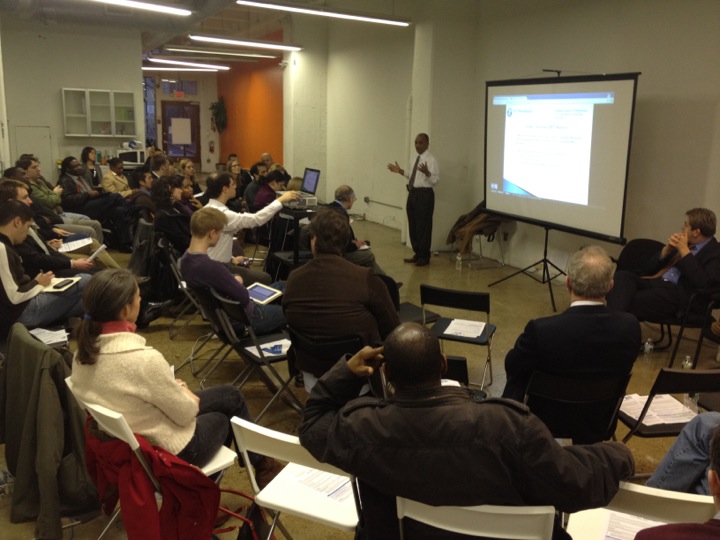
Talk the specifics of tax reform legislation long enough, and things will probably get confusing. So, attendees of an informational session on the impact of new city tax policy legislation had a lot to process from text-packed slides.
Councilman Bill Green, who co-sponsored one half of the bills and is making this a core tenet of his outspoken plans to run for mayor in 2015, was on-hand to try to make things a little simpler.
“This is really good news,” Green said at the event Tuesday night, hosted by the city’s Office of Arts, Culture and the Creative Economy. “And if we work hard, we’re going to have more of an impact in the future.”
More specifically, of 90,000 licensed businesses in Philadelphia, fully 30,000 would be fully exempt from city business privilege taxes when the reform is fully implemented by 2016, said Green chief of staff Sophie Bryan. That future seems well-timed for a politician of a high pedigree.
The new policy, which passed committee in October and was approved by Council and the mayor in November, will have a series of steps toward full-implementation, scheduled for 2016, right when Green seems to expect to be settling into his new role of city chief executive.
Below, find video of Green talking about the tax reform legislation, presentation slides detailing the changes and five of the biggest reforms you should know about.
Watch video of Green’s introduction at the event of the tax reform legislation.
[tech]XORronem53I[/tech]
For now, the administration, which rejected a 2010 version of the legislation but worked with Green to shape the policy with Chamber of Commerce input, has partnered to organize a series of town halls to try to make sense of these changes for those they’ll most affect.
As many as 30 freelancers, small business owners and others interested in the policy change came out for the event, held in first-floor storefront portion of the building that houses Old City coworking shop Indy Hall, which partnered in organizing the event. Full disclosure: Technically Philly was a media sponsor of the event.
Though there was little question that the event was largely a platform for Green, most of the two-hour session was made of the above Powerpoint presentation from Tilahun Afessa, the Director for Policy, Planning and Outreach for the Revenue Department of the City of Philadelphia.
See the presentation slides from Afessa.
[googleapps domain=”docs” dir=”present/embed” query=”id=ddgf79ms_3867rmkc3dp” width=”410″ height=”342″ /]
Afessa, a slight man working on 25 years with the city, spoke at length about the changes, which you can see in the above presentation. Here are the five biggest changes you should know:
- This tax reform comes the way of two bills, both signed into law by Mayor Nutter on Nov. 14, one dubbed ‘Jump Start Philly,’ introduced by Councilman Jim Kenney, and the second, larger one introduced by Green and Councilwoman Maria Quinones Sanchez.
- Beginning with this tax year, qualifying new businesses will not pay any city business privilege taxes for the first two years. They will need to have at least three employees and not have been previously subject to BPT.
- Beginning in tax year 2014, there will not be any fees to acquire a business privilege license for any new businesses. This is the $300 lifetime fee that got caught up in the ‘blogger tax’ controversy, which was resolved with a change in June 2011 that allowed ‘hobby’ activities to be exempt from needing the license.
- Businesses will have taxable net income exempted up to $50,000 in tax year 2014, $75,000 in 2015 and $100,000 in 2016 and beyond.
- City revenue plans are to lower the net income tax rate to six percent by 2022, an effort that Councilman Green says he wants to speed up.
Other tax reductions in the legislation are focused on companies that produce physical goods, not consultants, so some software and other technology companies may be in something of a gray area, said Afessa. Further reduction in that arena would require ‘market-based sourcing,’ said Green, meaning the city would need more data on where companies in Philadelphia have clients to know the impact on city revenue.
There is considerable more in the legislation, so it is advisable to take a tour through the above presentation and watch Green speak in the above video.
Toward the end of the session, an audience member asked about an easing of the online process to apply for the city business privilege license and other such functions. Though the city unveiled this year a redesigned Phila.gov and its business portal was revamped last year, Councilman Green said the web experience leaves a lot to be desired.
“Let’s just say it looks like it’s going to have to wait until the next administration,” he said.
Before the event began, when Technically Philly asked Green last night about reintroducing his paperless government legislation, he was as direct about his intentions as ever: “I guess I’ll just have to run for mayor,” he said, punctuating it with a confident laugh.







